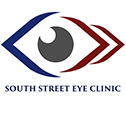To make an appointment at South Street Eye Clinic or Mount Lawley eye clinic you can call either clinic on (08) 9312 6033 or (08) 9371 1910. We do prefer you to organise a referral to be sent to either of our clinics and one of our friendly staff members will call you to arrange the appointment.
South Street Eye Clinic is located at suite 10, 73 Calley drive, Leeming, WA, 6149. We have free onsite parking and are accessible from public transport.
Mount Lawley Eye Clinic is located at Suite 4, 689 Beaufort Street, Mount Lawley, WA, 6050. We have free onsite parking and are accessible from public transport.
Appointments with an eye specialist often take longer than other doctors. At South Street Eye Clinic you will need to allow at least 2 hours for the whole process from your allocated appointment time. Please note new patients may take longer as extensive testing is performed on the first consultation. While we endeavour to keep your waiting times to a minimum, complex and emergency cases may affect these times.
Yes, to be eligible for the Medicare rebate you will need a valid referral. You can obtain a referral from a General Practitioner, Optometrist or Specialist.
No, during the visit with the Ophthalmologist you will have dilating eye drops instilled in your eyes causing light sensitivity along with blurry vision.
A valid referral, Medicare card, pension or concession cards, spectacles, a pair of sunglasses for after the appointment, an updated medication list and a contact lens case if you wear contact lenses.
Payment is required in full on the day of the consultation. We accept payment forms in Eftpos, Cheque and cash. If you have a valid referral and Medicare card we will process the Medicare rebate on the day for you. Private Heath funds do not cover in rooms consultations.
An Eye examination includes visual acuity (sight) testing, refraction, intraocular pressure measurement (eye pressure), examination of the front (anterior segment) and back (posterior segment) of the eye. Further tests such as visual field examination, OCT (ocular coherence tomography) and fundus fluorescein angiogram are performed accordingly.
An assessing staff member will do base line measurements along with imaging of the eye. Dilating eye drops will be instilled prior to seeing the Ophthalmologist as dilated pupils enable the doctor to see to the back of the eye. Once the eyes have completely dilated your Ophthalmologist takes a full medical history before continuing on with an eye examination. Further testing and imaging may be required upon request of the Ophthalmologist.
Intravitreal Injections are a common method to treat retinal diseases such as neovascular Age-related Macular Degeneration (Wet ARMD), Diabetic Macular Oedema (DMO), and Macular Oedema Secondary to Retinal Vein Occlusions.
Ocular Inflammation can be treated in a number of ways. This in part is determined by the cause and also may relate to the success of previous treatments. Treatments can include topical steroid treatment, systemic steroid treatment, steroid injection as well as steroid implants.
Oculoplastics, or Oculoplastic surgery, is a discipline in Ophthalmology that includes a wide variety of surgical procedures that deal with the orbit (eye socket), eyelids, tear ducts, and the face. Oculoplastics is commonly used as a term for plastic surgery or cosmetic eye surgery for the eyelid areas, either for cosmetic or necessary functional purposes. It also deals with the reconstruction of the eye and associated structures.
Vitreoretinal (VR) surgery is a subspecialised field in ophthalmology involving surgery in the posterior segment (back part) of the eye. VR surgery is required to treat severe sight threatening conditions such as retinal detachment, macular holes and advanced proliferative diabetic retinopathy. It is also employed in treating visually debilitating conditions such as epiretinal membranes and symptomatic vitreous opacity.
